County Cricket Groundsmen - Raining Champions!
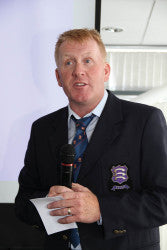 The Cricket Writers Club, which comprises pretty well all those that write about our summer game, bestowed its annual Peter Smith Memorial Award, for services to the presentation of cricket to the public, to all first class groundsmen. Stuart Kerrison who, as well as his role at Essex County Cricket Club, is Chairman of the County Groundsmen, received it on behalf of all of his counterparts.
The Cricket Writers Club, which comprises pretty well all those that write about our summer game, bestowed its annual Peter Smith Memorial Award, for services to the presentation of cricket to the public, to all first class groundsmen. Stuart Kerrison who, as well as his role at Essex County Cricket Club, is Chairman of the County Groundsmen, received it on behalf of all of his counterparts.
"It is true to say that, over the years, us groundsmen have had a few run-ins with journalists, so all of us getting an award from them was a surprise, but a very pleasant one," said Stuart.
He first heard about the Cricket Writers Award via a telephone call from the ECB's Chris Wood, but wasn't allowed to tell anyone about it initially because of a general press embargo before the awards gathering in London, which he attended with Kent CCC's Head Groundsman, Andy Pierson. It was a convenient 'stop off' for the two of them on their way to taking part in the Dennis/SISIS seminar at the SWALEC Stadium in Cardiff where, appropriately, they were making presentations on the topic 'Winning the battle - groundsmen v the climatic seasons', Stuart told me.
The Peter Smith Memorial Award was inaugurated in 1992 in memory of the much respected and loved cricket correspondent of the Daily Mail. This year, under the chairmanship of The Times cricket writer Pat Gibson, the Awards sub-committee decided it should go to, in their words, "a group of men who did most to present cricket to the public during the wettest summer for a hundred years." The award that Stuart accepted took the form of a donation to Perrenial, the charity that helps needy former groundsmen or gardeners.
In the twenty years of this award, the Sri Lankan team in 1996 are the only group to have won it: the others are pretty much a Who's Who of the game's great and good. This year's award was, therefore, different and rather special.
Speaking after the 2012 Cricket Writers Club Awards dinner in London, Peter Smith's widow Joan said: "My husband was always a great admirer of the work that was put in all over the country to maintain the cricket grounds used by counties, ensuring cricket could be played within reach of as many people as possible. I can honestly say he would have been very pleased to know an award in his name would be honouring groundsmen, particularly in the sort of trying summer we have had this year."
 The torrid conditions that faced our national summer game last season were the worst since 1912. According to The Cricketer magazine, however, it cannot be said categorically that it caused the biggest loss of playing time in a season, since there are no actual records of down-time due to weather for the whole of this time, but it must have been close.
The torrid conditions that faced our national summer game last season were the worst since 1912. According to The Cricketer magazine, however, it cannot be said categorically that it caused the biggest loss of playing time in a season, since there are no actual records of down-time due to weather for the whole of this time, but it must have been close.
Records have been kept since the County Championship was split into two divisions in 2000, and 2012 easily tops this with 890 hours playing time lost. Figures issued by The Cricketer show, for example, that Yorkshire lost a staggering 36 percent of potential playing time in the LV County Championship Division Two. Over 138 hours out of a possible 384 never saw any action. Every county was badly affected, but Headingly et al were the 'raining champions' you could say.
Conditions certainly had a detrimental affect on batting too, 2012 having one of the lowest number of first class averages topping 50. Only nine years since 1912 recorded fewer, and eight of these were in the days before covered pitches, not to mention bigger, stronger bats. This last season was a tough one all right, and groundsmen more than earned their corn.
"It is great for us all to be recognised in this way," said Stuart. "I think, because this last season was such a shocker for weather, journalists saw us working our socks off on blotters doing our utmost to get games moving, and now have a new respect for what we do. It is, undoubtedly, the main reason we received the award."
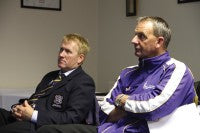 As we are chatting, Stuart gets a call from Keith Exton, Glamorgan's Head Groundsman, emphasising the togetherness there is between county groundsmen.
As we are chatting, Stuart gets a call from Keith Exton, Glamorgan's Head Groundsman, emphasising the togetherness there is between county groundsmen.
"We all get pressure from all quarters: the clubs who want results and satisfied paying customers, the paying public who simply want to see cricket, the ECB who want up-to-standard pitches."
"The pressure, of course, is on the umpires to get play under way, and the relationship between us and them as professionals has never been stronger. The pitch belongs to them from the toss, but they rely on us for local knowledge, and decisions to play or not, more than ever, are in the fullest consultation with head groundsman. We are very much at the sharp end of what are the commercial as well as sporting aspects of the game at county level. Groundsmen and umpires and very much colleagues in arms, especially as media scrutiny gets keener. Hawkeye and throw-away observations from the commentary box never tell the whole story."
"Keith at the SWALEC and Matt Merchant at Old Trafford usually suffer the worst weather, although strangely this year Essex, statistically often the driest of cricket counties, did fare worse than Glamorgan, losing five whole Championship days to rain. We lost more whole days this year than in all of my previous twenty years here, so it was a remarkably tough season," said Stuart.
The margins county clubs have to work on are tighter than ever, the more so since the introduction of Twenty20. Losing one of these games can cost a county between £60,000 and £70,000. Essex fared well here last season and managed to skirt around the weather. They and Durham lost not a single Twenty20 ball to conditions.
Stuart was 'elected' chairman of the county groundsmen ten years ago. They hold a meeting each year, recently during BTME. The next one is again going to be held at Harrogate. An agenda of topical issues is set. One of the hot topics in recent times has been the heavy roller ban. Stuart and his counterparts had a hard fight pushing this into the regulations.
After these annual meetings, they have a get-together with the ECB to discuss issues generally and regulations in p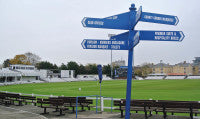 articular. There's no doubt the relationship between them and cricket's governing body has come a long way in the past few years.
articular. There's no doubt the relationship between them and cricket's governing body has come a long way in the past few years.
"In the past, many's the time we have been at loggerheads, but not any more. There is a much better working relationship with the ECB. What we've tried to do as a group of professionals is make sure we get our point across, and I think we've made good progress here," said Stuart.
"The roller taking the pace out of and killing pitches was our collective view, and the subsequent ban means we have been listened to, which is very satisfactory. We are a loose body but, nevertheless, one that has some clout at last."
The Cricket Writers Award can only strengthen the profile of groundsmen in the game. They each have different sets of problems, but there is much that links them.
"In club cricket, everyone wants to play on a belter - a shirtfront. That isn't always the case at first class level, and that is a huge pressure on us county groundsmen," said Stuart. "Everyone in the game wants their say on pitch matters, but it's us that have to do the work. Treading that fine line between bowling and batting attributes, especially for 40 and 20 over games, is a skill in itself, as well as battling to get a game on in poor weather."
Stuart is very proud of the fact that, in his time at Essex, he's never had a pitch reported. Pitch reporting, according to the Inspectorate, notably Tony Pigot, is a means of helping groundsmen, keeping them on their toes, maintaining standards. Stuart's view is that, seeing that a pitch has been reported in the press, does not give the full 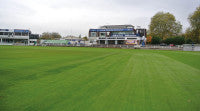 picture and creates an unfair image that sticks. It's a kind of double-edged sword. He does admit that, in the past, cricket groundsmen haven't helped themselves as far as image is concerned. 'Grumpy groundsman' has often been uttered beyond the boundary, even though, often as not, unjustly. It's now time they drew more attention to their work, he urges, and this award will definitely help.
picture and creates an unfair image that sticks. It's a kind of double-edged sword. He does admit that, in the past, cricket groundsmen haven't helped themselves as far as image is concerned. 'Grumpy groundsman' has often been uttered beyond the boundary, even though, often as not, unjustly. It's now time they drew more attention to their work, he urges, and this award will definitely help.
"We take enormous pride in our work, and sometimes we blow up if someone in the game shows zero respect, like a player dragging his kit over a freshly watered square or bouncing a ball on the pitch on match day," said Stuart. "The latter is actually an offence, but players sometimes disregard this. Am I grumpy if I tell them I can report it to the umpires?"
"Here at Essex, we do all we can to keep players and all associated with the club informed of what we're doing on and to the pitch and outfield. It's a useful open policy and, over all, it works well."
"I truly think that, nowadays, players, the ECB, everyone in the game has a better idea of what groundsmanship is. We're not just grass cutters and those that lug the covers on and off. There is at least a general understanding of the science it involves."
"The ECB's Chris Wood appropriately says we set the game's 'stage' and allow players to perform. If they forget their words, it's nearly always their fault, not ours!"
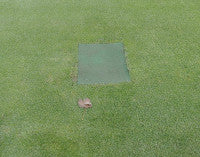 "I think us groundsmen have got to be a bit more outgoing in terms of talking about our work. It would be good too, in terms of informing the public, if there were pre-match press interviews, especially if there was a likely weather issue. If you're going to do a pitch report, we are the guys who will be the most accurate. I think we have to stop being so shy and stop worrying about looking foolish, because we won't. We are the experts after all. County groundsmen wouldn't be county groundsmen if they didn't know a hell of a lot about cricket surface preparation."
"I think us groundsmen have got to be a bit more outgoing in terms of talking about our work. It would be good too, in terms of informing the public, if there were pre-match press interviews, especially if there was a likely weather issue. If you're going to do a pitch report, we are the guys who will be the most accurate. I think we have to stop being so shy and stop worrying about looking foolish, because we won't. We are the experts after all. County groundsmen wouldn't be county groundsmen if they didn't know a hell of a lot about cricket surface preparation."
Stuart takes me out to the middle, a very 'green' experience in the middle of November.
Paradoxically, the Chelmsford ground is in the driest part of the country - with under 400mm of rain a year, it is classified as semi-desert - so Stuart's problem, by and large, is drought not drainage.
Although alongside the River Cam, he can neither extract from it, nor use a borehole. When it does rain, as it did in abundance the second half of last season, games there are as much prone to delay as anywhere. Blotters - and Stuart has two of them - do a great job for county groundsmen, soaking up excessive outfield moisture but, when full, their tonne and a half weight acts as a roller, effectively sealing the surface, so follow-up aeration work becomes essential. Last summer, as perhaps never before, journalists saw at close hand the hard labour put in to get play under way.
"At club level, quite correctly, you'd be better off letting the rain drain away naturally," said Stuart. "The reality for us is that members, and the game's authorities, expect us to do something about it right away. The frustration buck stops with us and, of course, the umpires who, this last summer, have bent over backwards to get play started."
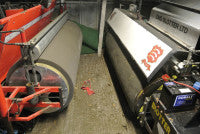 Rainwater is a costly business in county cricket. Stuart's two blotters - one twenty year old Australian model and a newer British machine - cost a lot to maintain. Putting new foams on them can cost up to £1000.
Rainwater is a costly business in county cricket. Stuart's two blotters - one twenty year old Australian model and a newer British machine - cost a lot to maintain. Putting new foams on them can cost up to £1000.
Last season, Stuart had a lot of problems with surface puddles because rainfall had been so fast. The ground's drains go to a sump below the level of the River Cam and this has to be pumped out but, because of the rain levels last summer, the pump was unable to keep up, causing a back-up of water. This was replaced and an additional surface pump, a 'puddle-sucker' as Stuart calls it, introduced.
There is nothing more depressing for cricket followers than the sight of surface water before a ball is bowled. Stuart says that, late in the season, the ground's new pump set-up worked a treat. Just prior to a CB40 game on the first Sunday in August, against Leicestershire, there had been an almighty shower, leaving a massive outfield puddle, which Stuart says was 120 feet by 60 feet. It looked certain that play would be abandoned, but hard work and the new pump meant the game, reduced to 25 overs, started at 4.00pm. Home supporters were especially pleased with Stuart and his team's work because Essex won by seven wickets. They were amazed and delighted enough to make a special presentation to him at the end of the season in recognition of his efforts.
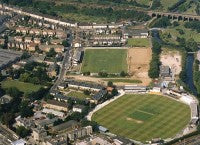 The County Ground at Chelmsford was acquired by the club in 1966 and has become its HQ. Prior to that, the club was a 'travelling circus' playing its home games at a number of venues across the county.
The County Ground at Chelmsford was acquired by the club in 1966 and has become its HQ. Prior to that, the club was a 'travelling circus' playing its home games at a number of venues across the county.
The outfield has recently suffered quite a bad bout of fusarium, which Stuart puts down to the gloomy conditions this autumn, coupled with warm, moist soil beneath. The square has 25 strips all told, 10 or 11 being used for First Class matches and Twenty20. After Graden Scarifier work, reseeding with Bar Extreme is Stuart's normal post-season routine. He uses five 20k bags, a lot less than many of his counterparts but, as he puts it: "I don't want to get coverage as thick as the outfield. I like to see a bit of soil between the blades. It makes for a better playing surface here."
Come spring, he'll be covering it, creating a micro-climate that will thicken it up. "What you get on top, you get underneath, and I don't like a thatch layer to develop," said Stuart.
He deals with any algae on the surface by applying a little bit of iron over the winter months. This and some hard spring brushing does the trick.
When it comes to topdressing, he uses just six 25k bags a pitch. Others may use as much as twelve.
"The grass we use is fast establishing and, importantly to us here, it is drought resistant," said Stuart.
As far as the outfield is concerned, in late autumn and early winter, Stuart and his team spend a lot of time verti-draining it whilst the grass is still growing.
Unlike Worcestershire's New Road, where Tim Packwood is the Head Groundsman, being adjacent to a river does not present a flood th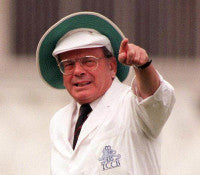 reat at Chelmsford. Even when other parts of the city are flooded, the ground never is."
reat at Chelmsford. Even when other parts of the city are flooded, the ground never is."
Stuart has been at Essex since he left school in 1984 and became head groundsman in 1991. He spent two winters in the late 1990s as head groundsman at the Newslands Ground in Cape Town, which included Test series and ODIs. His Chelmsford ground looked a picture in darkest November, and surely one of many up and down the country getting fit for next year's first class cricket season. Worthy of journalistic praise, indeed.
County Groundsmen in exalted company ...
Some of the past winners of the Peter Smith Memorial Award include Brian Lara, Dickie Bird (pictured right), Jack Russell, Christopher Martin-Jenkins, and Sir Alec Bedser
